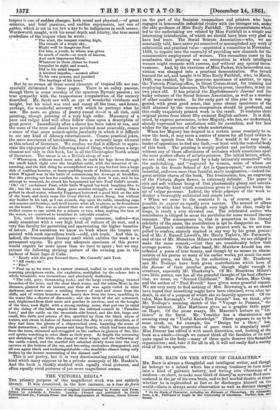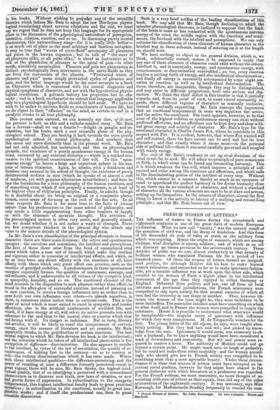MB.. BAIN ON THE STUDY OF CHARACTER. * MR. Bare is
always a thoughtful and intelligent writer, and though he belongs to a school which has a strong tendency to turn mind into a kind of galvanic battery, and feeling into vibrations of a mediumâin short, to make man think of himself a* nervous fluid accu- mulated in the jar of his own brain, and to feel morbid doubts at times whether he is replenished as fast as he discharges himself on the worldâthere is always acute observation as well as distinct thought On the Study of Character, including an Estimate of Phrenology- By Alexander Bain, A.M., Professor of Logic in the University of Aberdeen. Parker, Son, and Bourn.
in his books. Without wishing to prejudge any of the scientific theories which induce Mr. Bain to adopt the raw Hartigan physio- logical terminology about nervous vibrations and the rest, we must say we regret that he does not keep this language for its appropriate place in the discussion of the physsological antecedents of perception,
sensation, relation, emotion, and so on. In discussing purely mental phenomena, this extraordinary slangâfor it is really little betterâ is as much out of place as the most arbitrary and baseless metaphor. It may be trae that " waves of nerve-fluid" accompany all pleasures and pains in the human organism ; but to talk of " the wave of all pleasures alike, or all pains alike," is about as instructive as to talk of the plumb-line of pleasure or the spiral of painâin other words, absolutely meaningless. Pleasure and pain are phenomena as distinct psychologically from movements in the nerve-fluids as they are from the movements of the planets. "Protracted waves of pleasure and pain" mean simply protracted cycles of pleasure and pain, and the latter language would be far more accurate in a book on Character which is concerned with the mental diagnosis and physical symptoms of character, and not with the hypothetical physio- logical conditions. A galvanic battery has properties but no cha- racter; and in a book on character we submit that language applicable only to a physiological hypothesis should be laid aside. We have no wish to be unfair to nervous fluids as constituents of human life, but we do object to their "effusion" on the mind, as certain to end in a paralytic stroke to all true philosophy.
This protest once entered, we can honestly say that, of its sort, the present is both an able and a catholic-minded essay. Mr. Bain has a ferventâshall we say a fanatic Pâdelight in ganglia and ce- rebration, but his books mark a new scientific phase of the phy- siological school. They are leading it back towards the more purely psychological school of mental philosophy. And nowhere does this come out more distinctly than in the present work. Mr. Bain had not only admitted, but maintained, and this on physiological grounds, the existence of a purely spontaneous energy in the human mind, uncaused by any external stimulus ;âwhich is a marked con- cession to the spiritual consciousness of free will. To this "spon- taneous energy" he leaves a large and important sphere in his ana- lysis of human character. Again, he admits, with a frankness and freedom very unusual in his school of thought, the existence of purely disinterested motives in men (which he speaks of as almost a sort of madness, yet with genuine admiration nevertheless) ; and here he lays the foundation for a true philosophy of the human emotions, and of something even, which if not .properly a conscience, is at least of the highest class of utilitarian principles. Finally, he admits, though he is doubtful about its being an original or a composite pheim- menon, some sense of harmony as the root of the fine arts. In all these respects Mr. Bain is far more true to the facts of human nature than his predecessors in the same school of philosophy, and only needs a little supplementing from other teachers to supply us with the elements of accurate thought. His criticism of the phrenological system is often very acute, and generally sound; but we doubt whether it is not rather a waste of strength. There are few competent thinkers in the present day who attach any value to the minute details of the phrenological system In Mr. Bain's own elas.sification of the principal elements in human character there are three main divisions: the active and spontaneous energies : the emotions and sensations, the intellect and perceptions. The first of these three arise from the fund of unemployed vital power which takes a man out of himself, which make him restless and vigorous either in muscular or intellectual efforts, and which, so far as they have any direct affinity with the emotions at all, have affinity with those which oniy great effort can .procure, such as the emotion of gratified ambition. A predominance in these spontaneous energies especially favours the qualities of endurance, courage, and self-reliance, and is unfavourable to all virtues of the receptive kind, as sympathy, humility, and so on. The emotional element of the mind consists in the disposition to seek pleasure rather than effort, to brood in the after-glow of successful exertion instead of pressing on to new exertion, to receive foreign influences into us rather than to pour forth our own influences over othersâto absorb ourselves, in short, in conscious states rather than in external ends. This is the order of mind which is most suited to excel in sympathy and tender affections, also in the artificial excitements of civilized life, and which, if it have energy at all, will select its active pursuits less with reference to the end tian to the mental state or passion which that end brings with it. Its danger is indolence. But in taste, literary and artistic, it will be likely to excel the temperament of nervous energy, since the essence of literature and art consists, Mr. Bain apparently thinks, in the gratification of certain emotions. The last mental region to which Mr. Bain devotes his book is the intellectual; and the criterion which he takes of all intellectual phenomena is the perception of dijirenceâdiscrimination. He also appears to ascribe to the intellect, by virtue of the law of association, the quality of re- tentiveness, of holding fast in the memoryâso as to recover at willâthe various discriminations which it has once made. Where both these intellectual qualitiesâthe difference-perceiving, and the power of recalling at once a difference formerly perceivedâexist in great vigour, there will be also, Mr. Bain thinks, the highest intel- lectual quality, that of so identi4ing a perceived with a remembered Phenomenon as to discover new truth, new laws of creation, or new and poetic forms of expression. In subordination to the energetic temperament, this highest intellectual faculty leads to great practical inventions; in subordination to the emotional, usually to great ima- ginative works; and if itself the predominant one, then to great scientific discoveries. Such is a very brief outline of the leading classifications of this book. We may add that Mr. Bain, though declining to admit the minder phrenological theorems, is inclined to suppose that the back of the brain is more or less connected with the spontaneous nervous energy of the mind, the middle resion with the emotions and senti- ments, the forehead with the intellect and perceptions. We can only criticize the classification of these elements of human character in the briefest way in these columns, instead of entering on it at the length we should wish.
We have nothing to object to the general division, which is, we think, substantially correct, unless it be supposed to imply that any one of these elements of character could exist without the others. Intellect is, and is essentially, energy, and spontaneous energy, with consciousness or discrimination superadded ; so, too, every emotion implies a putting forth of energy, and also intellectual discrimination ; and finally all energy is necessarily intellectual by some slight sen- sation or emotion, as well as by ntellectual discrimination. The three, therefore, are inseparable, though they may be distinguished, and may enter in different proportions, both into actions and cha- racters. We think the chief defect in this treatise is that it partially regards, and, from its point of view, to some extent necessarily re- gards, these different regions of character as mutually exclusive, impression that of mutually supporting. Mr. Bain conveys the mpression that an emotional temperament In some way negatives the active, and the active the emotional. The truth appears, however, to be that none of the highest volition or spontaneous energy can exist without profound affections, and no affections can be kept deep and clear with- out great energy and activity of character. Mr. Bain's type for the emotional character is Charles James Fox, whom he contrasts in this respect with Pitt. It is evident, however, that where Fox wanted will and self-control, there his finer nature ran to seed and lost its true character ; and that exactly where it shone mostâin the personal side of political lifeâthere it was most carefully governed and mingled with manly eneru. The root of Mr. Bain's tendency to set up rival divisions of the mind is not far to seek. He will admit no principle of pure conscience or faith, in which alone can be found any reconciling harmony. This it is which awakens the free-will, which imposes a principle of self- control and order among the emotions and affections, and which calls in the discriminating genius of the intellect at every step. Without this, which cannot be a separate faculty so much as an openness of mind to apprehend the perfect harmony in the divine humanity close to us, there can be no standard of character, and without a standard of character all the various elements are sure to be at sixes and sevens, setting up for themselves. In the science of character, almost the first thing to know is the activity or latency of a unifying and reconciling principle ; and this Mr. Bain leaves out of view.































 Previous page
Previous page